Let's recap The Last of Us episode one
Shroom with a view.
When I was pregnant with my daughter, I did not realise it for a while. My dog, however, knew straight away. He became protective of me, constantly under my feet or curling up across my lap as soon as I sat down. He would not leave my side, and I did not understand why.
Soon enough, it all became clear. I was having a baby. Needless to say, I was surprised. But my dog was not. He knew. He had always known. Animals have a sense for these things. Which is why, when a dog started to become uneasy around a seemingly harmless lady in HBO's The Last of Us, I knew straight away something was amiss.
PLEASE NOTE: THIS ARTICLE CONTAINS SPOILERS FOR BOTH THE SHOW AND THE GAME IT IS BASED ON.
The TV adaptation of The Last of Us begins with a step back from Naughty Dog's 2013 game release. Rather than dropping us off in Texas with the Miller family, it takes us instead to a talk show from the late 1960s. Here, two epidemiologists are taking part in an almost all-too-relatable discussion on viral and biological pandemics.
It is a clever move by showrunner Craig Mazin, with this cold open setting the stage for the rest of the series. This version of The Last of Us is not going to be a scene-by-scene reenactment of the game, so it will be accessible to those who do not know the story already. However, it is still going to give those who do know the story plenty of sustenance.
Think of this as bonus content, rather than a hard steer away from its source material. It sets the audience up for what is to come, giving those who have not experienced The Last of Us before some context, while acknowledging its long-term audience. This opening laces our expectations with the right amount of tension and unease before we meet the series' core characters and embark on their journey.
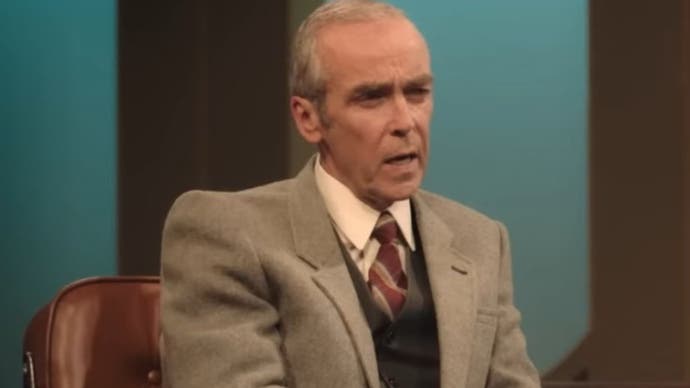
Following the show's cold open and its subsequent title sequence - itself an homage to the game's own opening titles, but with some added flair for TV - we meet Sarah Miller, Joel's teenage daughter played by Nico Parker.
Parker brings a warmth to Sarah, with the viewers seeing the world through her eyes. We follow her as she makes breakfast for her father, we see her at school, we see her taking Joel's watch to be fixed. In these brief moments, a heartfelt connection is made between the viewer and Sarah - a testament to Parker's portrayal. Within a few relatively short scenes, we know that Sarah cares deeply for her father, and he for her. Joel needs Sarah as she needs him.
But while Sarah goes about her day, small hints show something is not right in the wider world. Sirens can be heard, people appear anxious, an old lady takes an unusual turn, a dog whines. Soon, these small hints become an all-too-real outbreak.
As in the game, our first sight of someone afflicted with the fungal Cordyceps infection comes from a once benign neighbour. Unlike in the game, however, this neighbour is not a middle-aged and presumably healthy man (Cordyceps aside). Rather, this neighbour is Nana - an elderly and once immobile lady who, before becoming infected, required full-time care.
Seeing the infection take hold of someone who was so defenceless and fragile only that afternoon shows us the scale of what this fungus can do. It can manipulate its host, bypassing any preexisting conditions that could render a person incapable of their own self-care, and turn them into an animated and volatile force. This simple change by the showrunners created one of the most unnerving pieces of television that I have seen in years.
The impact of this sudden change in Nana is felt even more deeply thanks to Sarah's reaction to her aggression. Following Nana's execution by Joel, Sarah sheds a tear at the situation she now finds herself in. Her once harmless neighbour is lying dead on the ground in front of her, with her father the murderer.
Next, the camera gets close to Sarah as she, along with her father and her Uncle Tommy, attempt to flee in their truck. As we follow the Millers, we see the scenes of devastation unfolding around them in an almost perfect recreation of the game, from the dialogue between Joel, Tommy and Sarah to its choreography.
The camera pans from distressed civilians running for their lives and onto burning buildings, all the while staying close in on Sarah. It evoked all the same feelings I had when I played the game for the first time.
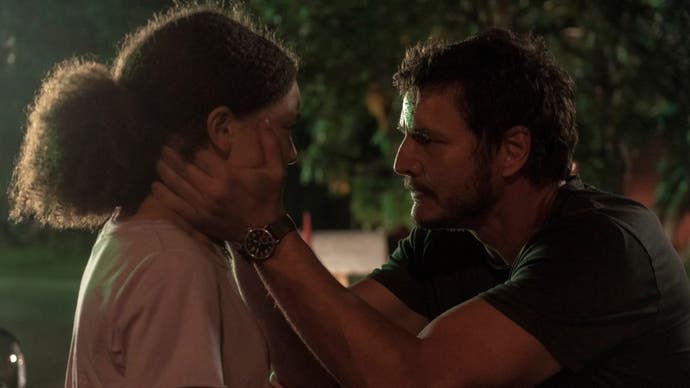
While we may only have a brief time with Sarah, with her death in Joel's arms as impactful as it was in the game, her role is pivotal for Joel's on-going story.
When the scene cuts to 20 years later, bringing us to 2023, we are met with a man hardened by his past trauma. This is shown in how easily he can pick up and dispose of the body of a child that has been euthanised after becoming infected.
This mirroring of scenes, with the audience just moments before seeing him cradling his daughter with such love and desperation, made his present mental state all the more apparent. Joel is now a man with a certain disconnection from the world around him, witnessing executions without flinching and selling contraband for cigarettes and cards in Boston's Quarantine Zone.
We are immediately presented with the harshness of this post-outbreak reality. The QZ is succumbing to both the force of nature and the oppression of the militaristic FEDRA. The once-colourful scenes from Texas have been replaced with muted greens and browns. A tonal shift in both colour and society's general outlook: bleak.
It is in the QZ we meet Anna Torv's Tess. Like Joel, she is hardened to the world around her, having learned to do what is needed to survive. She can fight, she can take a punch, she can negotiate, she can manipulate.
This is one example of how TV can immerse its viewers in a character and their individual ordeals in a way the game didn't. We are not tied to one player character, giving the off-screen stories of the likes of Tess a chance to be elaborated upon. While in the game we are simply told of Tess' ordeal of being jumped by Robert's men, in the show we can see her with Robert before she returns to Joel.
As for her relationship with Joel, in the 20 years since the Cordyceps outbreak began, Tess and Joel have come to rely on each other as friends, as well as romantic partners. This was something hinted at in the game, but never expressly shown. Tess can calm Joel when others can't, and she can use him (and his muscles) when she needs to. Torv's portrayal of a steely and pragmatic Tess is both comforting and a little bit frightening.
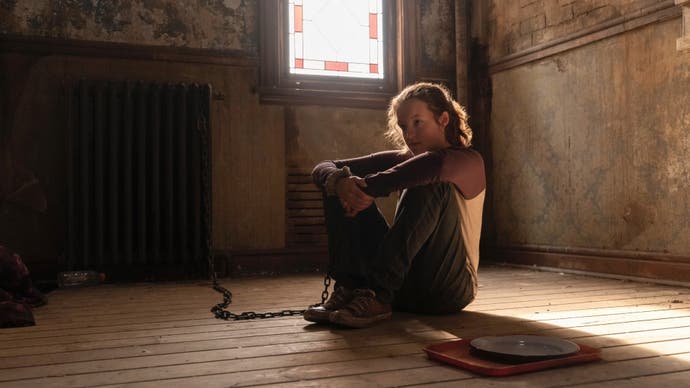
Finally, we meet Ellie and the Fireflies. As in the game, the show has been building to this moment, even without specifically telling us. We have been made aware of the unrest in the QZ, with Fireflies labelled "terrorists" by some within its walls. We know Robert betrayed Tess after he sold goods he owed to them to a mysterious other party (in the case of the show, a car battery rather than weapons). We know Joel and Tess are going to get their revenge on Robert.
As with Tess and Robert, we meet both Ellie and the leader of the Fireflies (Marlene, played wonderfully by Merle Dandridge who also played Marlene in the game) away from Joel. The Fireflies are holding Ellie in a room, chained to a radiator against her will.
Ellie's introduction here is, in my opinion, perfect. Bella Ramsey is Ellie, with a balance of innocence and a toughness that those who are familiar with the games will immediately recognise. Any doubt about Ramsey's casting will soon be cast aside, and that is even before we get to her chemistry with Pedro Pascal's Joel.
The first moments between Ellie and Marlene shown in this adaptation are important for many reasons, but there are two in particular worth highlighting. When we watch Ellie and Marlene's initially touchy introduction, Marlene talks more about Ellie as a baby and how she knew her mother. While Ellie mentions Marlene knew her mother in the game, it is said in an off-hand way and this relationship is one featured in passing mentions and collectables. However, given we have seen Ashley Johnson as Ellie's mother Anna in trailers for the show, this conversation is clearly setting The Last of Us viewers up for some flashback scenes in upcoming episodes.
The second point worth highlighting is the mention of Riley. As with Anna, trailers and promotions for the series have shown Storm Reid as Riley, so again those who know the game, along with its DLC and comic series, will have an understanding of who she is. However, for those new to the series, this mention of Riley once more builds up intrigue for future episodes.
This conversation between Ellie and Marlene allows the two to form an understanding, paving the way for what happens next - something we can assume to have also happened in the game but was never shown. This scene adds more gravitas to Ellie and Marlene's characters, and the relationship the two share.
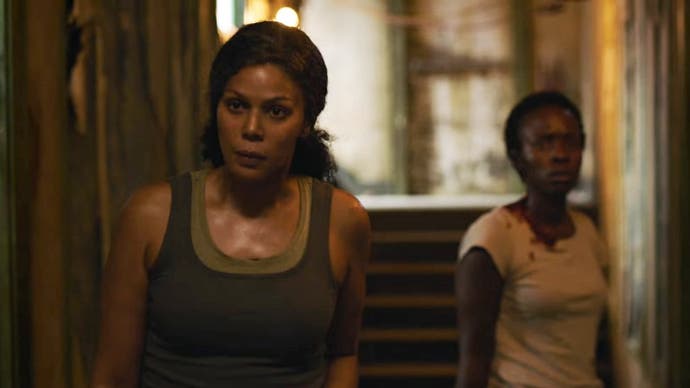
At this point, we are brought back to Joel and Tess on their endeavour to settle the score with Robert and his men. They get word of where he is, and make their way through the QZ to where they have been told he is meeting the other party interested in the car battery. However, rather than fighting Robert's men at this point like in the game, the duo arrive at his location to the smell of gunpowder and blood.
An offscreen shootout between the Fireflies and Robert has ensued, with Marlene injured in the process. And it is here where Joel and Ellie finally meet.
Their first introduction to each other is as laden with doubt and mistrust as you would hope. Ellie may be a child, but that does not stop Joel pointing a gun at her. In turn, Ellie comes at him with a knife she keeps on her person in a bid to protect Marlene, as she does in the game. Unlike in the game, however, Joel disarms Ellie here and continues to act abrasively towards both her and Marlene.
Eventually, Marlene explains that Ellie needs to be smuggled out of the QZ, and given Joel and Tess' availability (and heartbeats), they should take the task on. Begrudgingly, Joel and Tess accept the job as Marlene leaves to seek medical help (but not before imploring Joel not to "fuck [this] up").
Ellie and Joel are soon left alone by Tess, as happens in the game, and the scene in Joel's apartment with Ellie will be familiar to those who have played the game already. That is, bar the introduction of a smuggling radio code with music from certain eras meaning different things to the receiver, Joel. Joel proceeds to fall asleep on the sofa, while Ellie is left to amuse herself in the apartment.
It in this moment, after Joel wakes up, that we once more see Ramsey's ability to play Ellie as both vulnerable and also wise beyond her years. She shows a certain level of fear about leaving the QZ. Despite a facade of bravado, Ellie is scared.
Meanwhile, while Joel does not comfort her in the way he would have comforted Sarah had she insinuated the same worries, he does reassure her. This is a sign that, while at this point Ellie is still just 'cargo' to him and Tess, he was once a father who cared very deeply for a young girl. No matter what someone may want, these are feelings and instincts that don't just go away for a parent. The chemistry between Pascal and Ramsey here is incredible. And, of course, Ellie can break the sincerity of this moment with a 'joke' at Joel's expense (she tricks him into revealing more of his smugglers code).
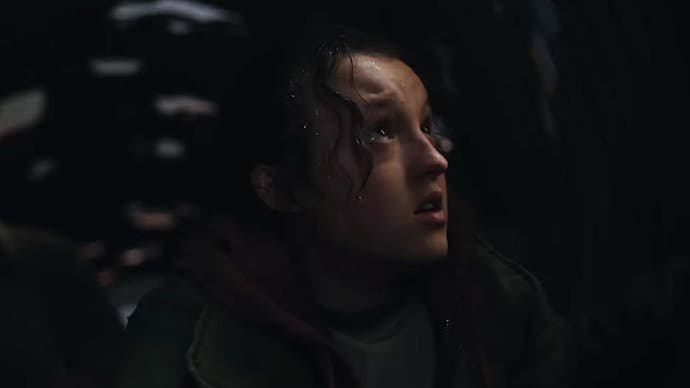
On Tess' return to the apartment, the three set off on their journey away from the confines of the QZ. Ellie is left in awe by her new surroundings beyond the wall, almost getting them caught - another nod to Ellie's innocence when it comes to the wider world beyond Boston.
As with the scenes earlier with Joel and Tommy in the car with Sarah, the shots of the three sneaking their way through the outskirts of Boston feel like they’re pulled straight from the game. The stealthy way they have to move, ducking into pipes to avoid being seen by the FEDRA spotlights, feels very familiar.
The show ends with a pivotal moment from the game - a FEDRA soldier discovering Ellie, Joel and Tess outside of the QZ.
Unlike in the game, the soldier is on their own as they conduct the scan to see if any of the trio are infected. At this point, Ellie lashes out with her knife, stabbing the soldier in the leg. Evading any further attacks from Ellie, the soldier holds them at gunpoint.
It is here that Joel, triggered by his PTSD, is crushed by a sadness as he remembers the moment he was held at gunpoint with his daughter just before she was shot. His sadness soon turns to a blind rage, and he lashes out at the FEDRA soldier, pummeling him to death. In the game, the execution of the FEDRA soldiers is much more 'clinical' with gunshots to the head.
Once again, this scene mirrors the one from earlier in the show when Joel kills Nana in a bid to protect Sarah. Joel seems apologetic of his actions in front of a young girl. However, while Sarah cried, horrified having seen her father killing a person in defence, Ellie remains shocked but defiant. Perhaps, despite the shocking actions of what she has just witnessed, this shows her that Joel can indeed protect her on their journey across America.
But before we can really get a grasp on what Ellie is thinking in this moment, however, we are brought back into the present with the realisation that Ellie is infected. Tess sees her result and immediately puts the defences up. Ellie begs for them to understand that while she is infected, she is immune. Before she can explain further, however, the three have to run into the night to avoid being caught by FEDRA once more.
This moment may well have one of the finest needle drops that I can remember in a show. As Ellie flees from FEDRA and the QZ with Tess and Joel, Depeche Mode's "Never Let Me Down Again" starts playing the episode out.
"I'm taking a ride with my best friend, I hope he never lets me down again, He knows where he's taking me, Taking me where I want to be, I'm taking a ride with my best friend."
This song feels like it will have more meaning for the show, and Joel and Ellie themselves, as the series goes on.
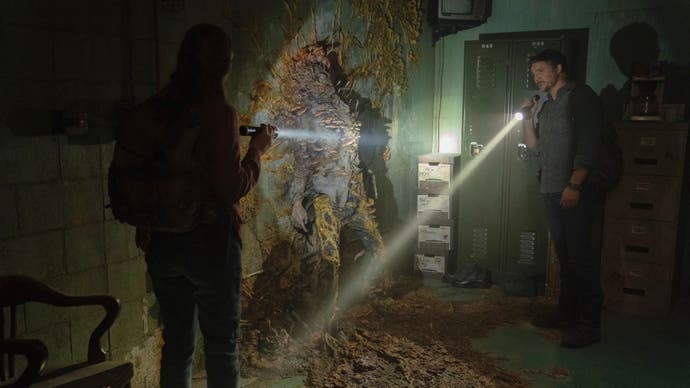
All in all, this first episode is a confident start for The Last of Us' TV debut. It does a brilliant job of laying a strong foundation for the series, with nods to the game littered here and there for fellow fans to spot (bricks prop up Joel's bed, and these made me smile). Its cast already has me believing and investing in every character. While I know this will leave me open to heartbreak once again, I want to watch more.
As someone who knows the game intimately, I did feel some of the episode veered a bit towards the filler side of things, but I can also fully appreciate the reasons behind each scene. A framework has been built with episode one, and has provided an excellent jumping off point for the (presumably) more action-focused narrative ahead.

